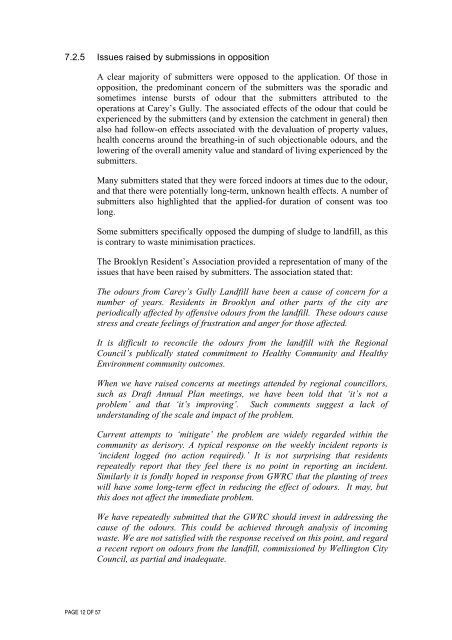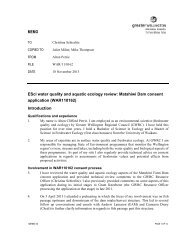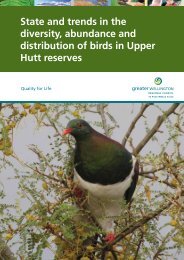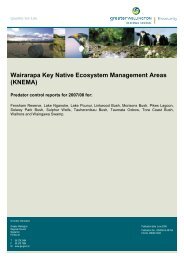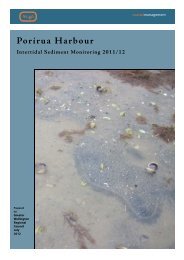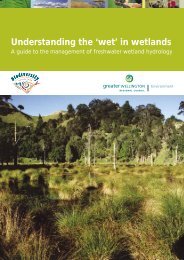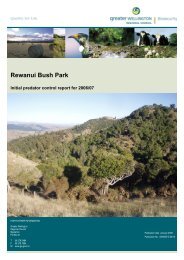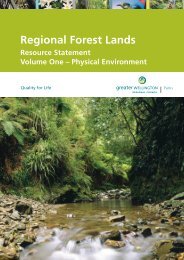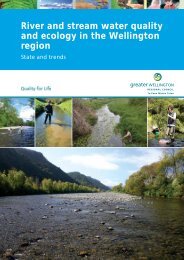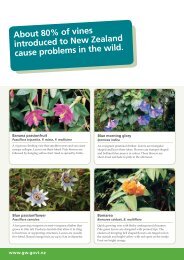Decision report- Carey's Gully Sludge Dewatering Facility - Greater ...
Decision report- Carey's Gully Sludge Dewatering Facility - Greater ...
Decision report- Carey's Gully Sludge Dewatering Facility - Greater ...
Create successful ePaper yourself
Turn your PDF publications into a flip-book with our unique Google optimized e-Paper software.
7.2.5 Issues raised by submissions in opposition<br />
PAGE 12 OF 57<br />
A clear majority of submitters were opposed to the application. Of those in<br />
opposition, the predominant concern of the submitters was the sporadic and<br />
sometimes intense bursts of odour that the submitters attributed to the<br />
operations at Carey’s <strong>Gully</strong>. The associated effects of the odour that could be<br />
experienced by the submitters (and by extension the catchment in general) then<br />
also had follow-on effects associated with the devaluation of property values,<br />
health concerns around the breathing-in of such objectionable odours, and the<br />
lowering of the overall amenity value and standard of living experienced by the<br />
submitters.<br />
Many submitters stated that they were forced indoors at times due to the odour,<br />
and that there were potentially long-term, unknown health effects. A number of<br />
submitters also highlighted that the applied-for duration of consent was too<br />
long.<br />
Some submitters specifically opposed the dumping of sludge to landfill, as this<br />
is contrary to waste minimisation practices.<br />
The Brooklyn Resident’s Association provided a representation of many of the<br />
issues that have been raised by submitters. The association stated that:<br />
The odours from Carey’s <strong>Gully</strong> Landfill have been a cause of concern for a<br />
number of years. Residents in Brooklyn and other parts of the city are<br />
periodically affected by offensive odours from the landfill. These odours cause<br />
stress and create feelings of frustration and anger for those affected.<br />
It is difficult to reconcile the odours from the landfill with the Regional<br />
Council’s publically stated commitment to Healthy Community and Healthy<br />
Environment community outcomes.<br />
When we have raised concerns at meetings attended by regional councillors,<br />
such as Draft Annual Plan meetings, we have been told that ‘it’s not a<br />
problem’ and that ‘it’s improving’. Such comments suggest a lack of<br />
understanding of the scale and impact of the problem.<br />
Current attempts to ‘mitigate’ the problem are widely regarded within the<br />
community as derisory. A typical response on the weekly incident <strong>report</strong>s is<br />
‘incident logged (no action required).’ It is not surprising that residents<br />
repeatedly <strong>report</strong> that they feel there is no point in <strong>report</strong>ing an incident.<br />
Similarly it is fondly hoped in response from GWRC that the planting of trees<br />
will have some long-term effect in reducing the effect of odours. It may, but<br />
this does not affect the immediate problem.<br />
We have repeatedly submitted that the GWRC should invest in addressing the<br />
cause of the odours. This could be achieved through analysis of incoming<br />
waste. We are not satisfied with the response received on this point, and regard<br />
a recent <strong>report</strong> on odours from the landfill, commissioned by Wellington City<br />
Council, as partial and inadequate.


